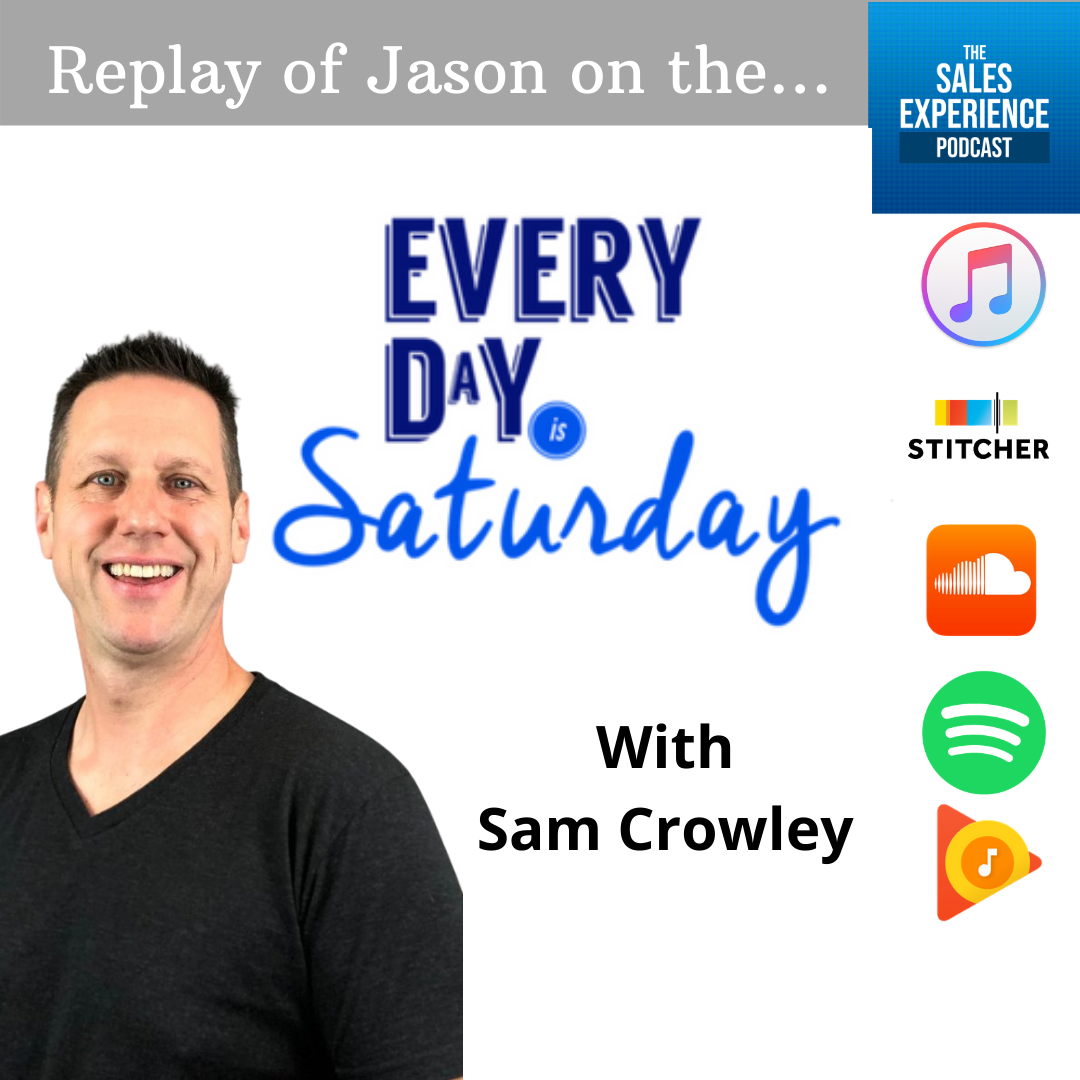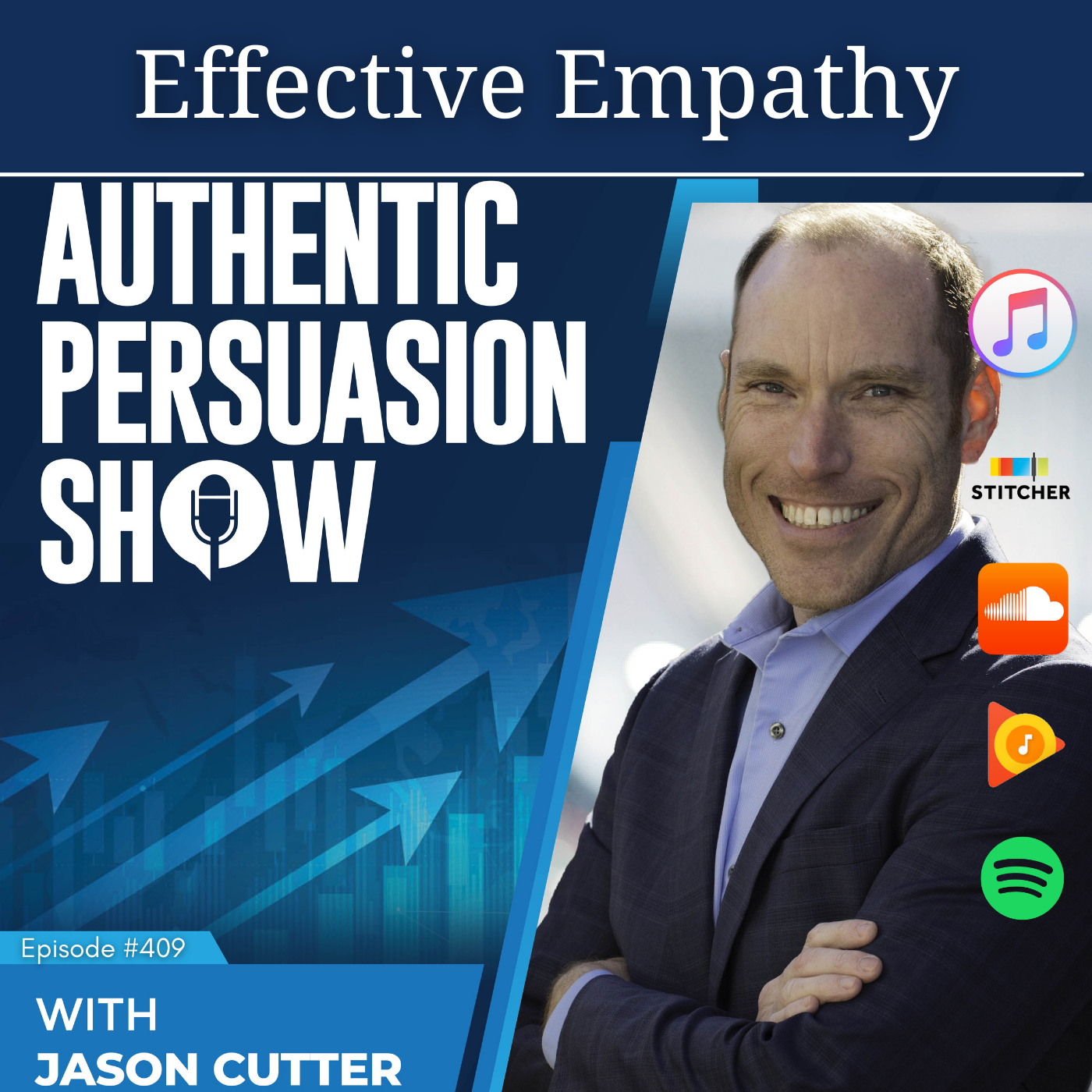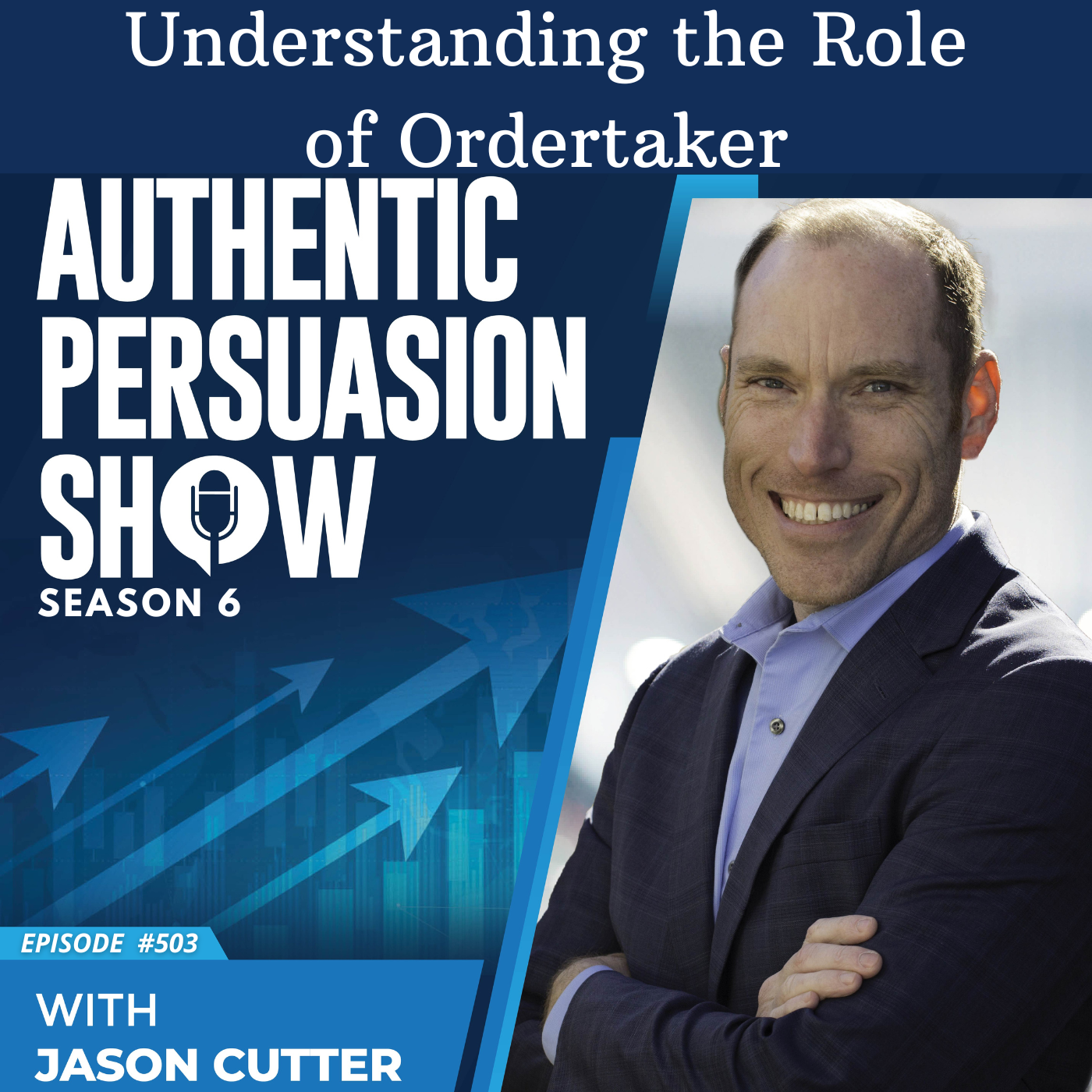Episode Transcript
Jason [00:00:00]:
This is the authentic persuasion show. Hey, what's going on? Welcome to episode 615 of the Authentic Persuasion show. So recently, I had the actual fun and pleasurable experience of getting my oil changed in my car. Now, why am I talking about that on a sales podcast where we talk about authenticity and persuasion and sales processes and comfort zones and challenges? Well, the reason why is that this experience, getting my oil changed, was different than what I expected. And unfortunately, what I expected was what a lot of people experience when they go to get their oil changed or taking their car for service. So here's what normally happens. And I've gotten oil changed in my cars for a very long time, right.
Jason [00:00:56]:
I've done it enough times where I know what the experience is like. You go to a quick oil change type place, and what happens is you pull up, and then they start going through the car, and as they're going through things, they start telling you about all the stuff that you could get done or should get done, and they're basically trying to upsell you. So you go in, maybe you have a coupon, maybe it's one of those $39 oil change places, and the next thing you know, you've agreed to a bunch of stuff, and it's hundreds of dollars. And for most people, if they don't know cars really well, then what happens is you're just trusting that if that person says you need a new cabin air filter or you need your transmission fluid flushed or a radiator flush or this or that, that it says, hey, in the system it says you need that every 30,000 or 50,000 miles, then that must be accurate. And so I must do it because this person is a professional, and they're doing this all day, and they wouldn't upsell me things that I didn't need. Right. Well, I think a lot of people have had the experience where you go to a place like that and you just end up, when you've done it enough times, is where you're just defensive. I'll speak for myself.
Jason [00:02:16]:
I know that when I go to those places, I know what needs to be done. I know cars well enough, and I know what I need in that moment and what I don't need in that moment. And so what happens is I go to those places and my wall is up, right. My defenses are high, and I'm ready to be assaulted with lots of upsell and cross sell opportunities that I'm going to have to say no to. And I don't enjoy saying no. I don't enjoy. It's not even confrontation. But I don't like being told what I should buy or being pushed to buy things if I don't want them.
Jason [00:02:52]:
And then also not knowing, like maybe that is something I need versus maybe that's not something I need. Right. And I think a lot of people, when they get in those scenarios, they just agree to everything because they either don't know or they don't want to say no, and they don't want to have to deal with somebody kind of pushing them. And so they just agree. They go through the process, they pay, they drive away, and then they regret it. They have some level of buyer's remorse. They feel bad about how much they spent. They feel like maybe they were taken advantage of, taken for granted, and they just don't feel well.
Jason [00:03:25]:
It's like, I know I needed to get my oil change and I don't feel well. And I will say this happens and can happen in a lot of scenarios. It can happen at the dentist, it can happen to the doctor, auto repair, home maintenance, anything where you might not know all of the details or you may not be able to say concretely exactly what you want and don't want or what's needed and not needed, and you're trusting that person to tell you. However, a lot of times people will leave with this feeling like, I think I paid too much, or I think I overbought, or I think I bought too many of the extra services that I really didn't actually need. And so the problem is that the next time I go to get my oil changed, now my defenses are high, now I'm on high alert, and now I'm watching and worried or thinking about what's going to happen, what they're going to try to sell me. And so what happens? I go into that experience with that feeling. Then what happens? And I caught myself this most recent time when I got my oil change from a completely different place I've never used before, and another quick oil change place, so not the dealership. And they were so great.
Jason [00:04:38]:
They didn't try to sell me anything. They showed me that I was fine in all the categories. They took care of everything very well, very professional. If they had recommended anything, I probably would have bought it, because their process was focused on service and value and not trying to hit metrics or quotas or numbers or requirements for upsell or some kind of ticket value, revenue per car type of KPI that they might be running. And so it's very important because one of the things that happens. And I've been obviously recording a lot of episodes with guests for this season who are sales professional educators. Right? So they're teaching sales programs or they're a part of higher education sales programs. And we talk a lot about in the beginning with their students, what their students think about sales.
Jason [00:05:34]:
And unfortunately, it's what most people think about sales, which is sales is gross, or sales is something you do where it's your incentives and your needs and desires, or you just want to make money like that salesperson. And then it doesn't really matter what happens to the other person. And usually that's the result of transactional type sales. Like when you go to get your oil changed or you go to a furniture store, you go to buy a car, or you go to buy anything significant where it just feels transactional and that person is trying to make money. If you've gone to a clothing store where the people there make commission like Nordstrom, for, like, they have a base, but most of their metrics and most of their revenue, like their income that they make is based on commission, based on how much they sell. And so I've been in Nordstrom so many times where sometimes it's obvious that person is just trying to sell me as much stuff as possible. And then other times I can tell that person is trying to sell me the right things that I'm looking for and actually helping me. But the challenge is that if you don't have the right people you're engaging with in those transactional sales, it will give sales this feeling of being gross and something a, you don't want to go into for work, and b, you don't even want to deal with.
Jason [00:06:53]:
Right. Like, if there was a way I could pull into an oil change place and interact with nobody so I could just get it done, I would like that. It's the same reason that even though the business model has struggled and things have changed, there was a period of time where Carvana was very popular and you could see them everywhere. And if you're not familiar with it, it's a multi story vending machine for cars. So what happens is you buy a car online, you pay for it, you do all of these things. You get this token, and then you put it into the machine like it's a vending machine. And then your car comes out of the machine and then that's your car and you take it away. And really what that signifies in that person list, salesperson list process is how much people do not want to have to deal with a salesperson.
Jason [00:07:44]:
It's why Tesla is a popular dealership. And for anyone old enough to remember, Saturn was a very popular dealership and sales model. Their cars weren't great, but the model was no negotiation, no haggling. Here's the sticker price. Take it or leave it, right? We're not trying to overcharge you. We're not going to sell you a bunch of crap you don't need. Here it is. If you want to buy it, here it is.
Jason [00:08:08]:
Right? Let's remove the negotiation process. Who's going to win and who's going to lose mode. Like, here it is. This is it. Do you want to buy it? Right? Like, this is a couch. Do you want to buy this couch? It's $1,200, right? There's no negotiation. Like, hey, I'll give you less. Hey, I'm going to sell it for more.
Jason [00:08:29]:
It just is what it is. And really, when you look at a Carvana model, when you look at so many things where people would rather deal with something online than deal with salespeople, that tells you what's wrong with sales. And in those transactional modes, that's what gives sales such a bad name. It's not so much the professional salespeople. That's usually a lack of experience, a lack of training, a lack of skills and awareness, not so much a motivation or a manipulation problem as much as those things. But when it comes to transactional, that's what happens. That's where it gives that air. And again, the challenge, and this is why I bring this up with the oil change example, is that what happens is when somebody has that bad experience moving forward, they have their wall up, right? They have their guard up.
Jason [00:09:15]:
Most people feel like other people will have good intentions until they have a bad experience. Once you've had a bad experience, you're like, wait a second. When I go back into that situation again, let's say I go buy another car or I go get my oil changed again, or I go to a dentist again, and maybe they're going to try to sell me lots of stuff. It's one of those things where once that happens, then your walls are up and then you're on high alert and you're either looking for it or you're defensive and you're torn between, I need help and I don't want to be screwed over. And so that's really the key, is to focus on that if you're in sales is to make sure that you're focused on what the other person needs. What they want, what's in their best interest, and that's so important. It's also really important. And this is part of where I think this is most valuable is because I'm not going to say everybody, a lot of people who listen to this podcast that I know of, and of course, there's a ton of people out there who I don't know who are listening to this, is you're probably in either higher transactional sale, right? Let's say something like furniture, cars or something where it's more of a considered purchase or you're in some kind of b to b professional sales, or you sell to salespeople or organizations, right? Like technology and things like that.
Jason [00:10:35]:
Obviously you're still in sales, but the key is that you might say, well, that's not me, I don't do that, right? Like, I don't act like the oil change company or this or that. The thing is, and this is where I empower everybody. Vote with your dollars, right. It will make a difference. If you go to a place and it is a bad experience, don't go there again. Right. Like, I found myself recently doing that with restaurants where go to a restaurant, the service is terrible. Not just the service is terrible because it's understaffed, which is a problem now for the last few years.
Jason [00:11:08]:
But like, managers don't care, staff doesn't care, nobody cares. Or I walk into a restaurant and literally no one will come up to greet you for minutes and minutes and minutes. It's like, turn around and leave and just don't go back. Stop giving them your money and encouraging them or enabling them to not care about service. And so same thing with sales, right? Like, if you have a bad experience or you have an experience that doesn't make you feel right, go find somewhere else, right. Remember, there's always options. There's very few monopolies out there that you can't overcome. Otherwise, most of the time there is a choice and you could choose something else from the sales side.
Jason [00:11:47]:
Just focus on, take these lessons and think, okay, when I'm a customer, what do I experience that makes me feel gross and not want to deal with salespeople and then extrapolate that, put that into your sales life. And when you're in sales, think about, okay, what can I do that's different because I don't ever want my customers to feel that way about me. Problem is, a lot of people are in sales, they're on autopilot. They're not thinking about it. They're thinking, oh, I'm in sales mode, so I've got to do this. And then when they clock out of sales mode, they're in customer mode or in life mode, and then they expect this over here and it should be consistent. You want it to be the same. You want to do the same thing.
Jason [00:12:25]:
You want to give your customers the experience that they're looking for, which is most likely the experience you want when you're a customer out there in the world. That's why I say, really, the only thing that matters is the sales experience, because that's what people are looking for. And if it's a great experience, they will want it over and over again or they'll tell their friends and family about it. If it's a terrible experience, they will stop. And so make sure you focus on that. What sales experience are you giving? Are you giving the one where your customers are pulling away from your oil change lane or your store or your phone call or your video and going, wow, that was amazing. I can't wait to go back. I got to remember that place and those people and that person who helped me.
Jason [00:13:09]:
Or are they pulling away or getting off the call or leaving your store and going, wow, that sucked. I feel terrible. I feel buyers remorse and regret, and I've got to make sure to never, ever talk to that person again or go there again. So hopefully that helps put that into your sales process and make sure that you're focusing on the sales experience.
![[615] Lessons About Sales From Getting My Oil Changed](https://episodes.castos.com/salesexperiencepodcast/images/1519584/Lessons-About-Sales-From-Getting-My-Oil-Changed.png)


